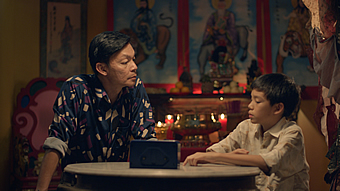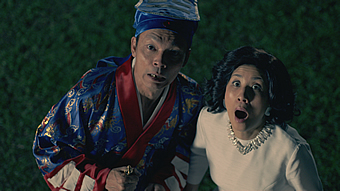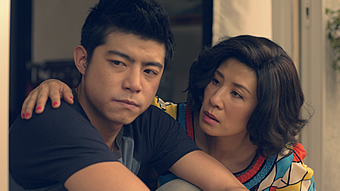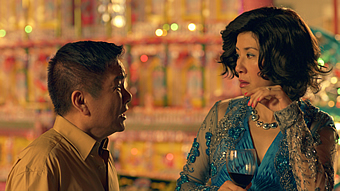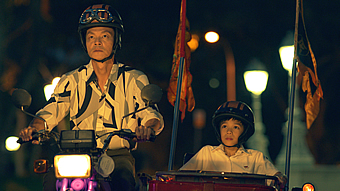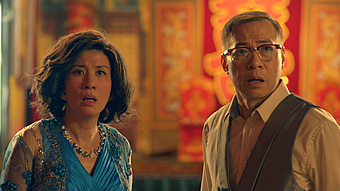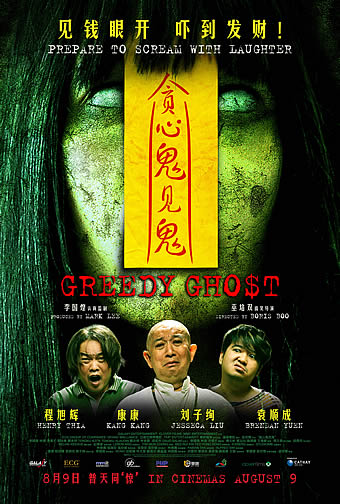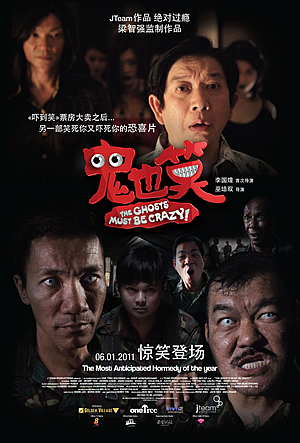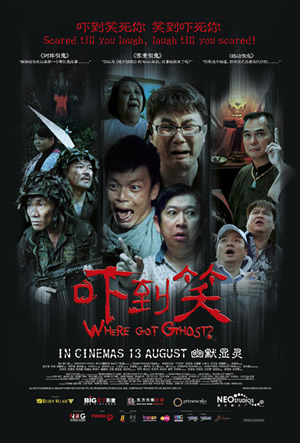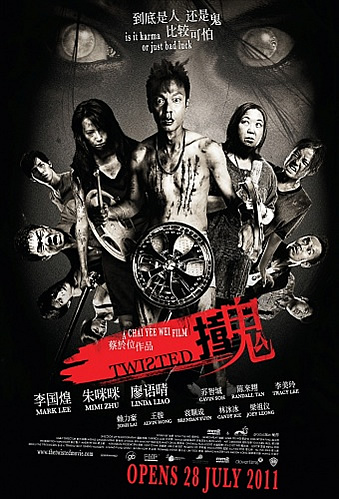A FANTASTIC GHOST WEDDING (非常婚事) (2014)
Genre: Comedy
Director: Meng Ong
Cast: Mark Lee, Sandra Ng, Jim Chim, Wang Po-Chieh, Kenji Fitzgerald, Keane Chan
Runtime: 1 hr 37 mins
Rating: M18 (Some Mature Content)
Released By: Golden Village Pictures
Official Website:
Opening Day: 20 November 2014
Synopsis: Neurotic ex-singer MRS WU hires 11-year-old spirit medium BOY and his single father MASTER WONG as highly recommended but highly unusual matchmakers, tasked to find a wife for her dead teenage son, PENG. Using an old Chinese matchmaking ritual, the three of them embark on the search for a perfect bride. However, the situation becomes challenging when they move from place to place and yet, the right bride cannot be found. Apparently PENG had died a mysterious death and he could be un-rested. When the search takes on an unexpected turn, MASTER WONG insists that the match is legitimate but MRS WU strongly disagrees. BOY begins to wonder if the ritual is bogus and if they are phony mediums. At the same time, BOY is facing problems in school. As MRS WU charges head on to organize an elaborate wedding banquet for PENG, the fight between her and MASTER WONG escalates. But as the clock ticks closer to the ghost wedding, who will the “bride” be? At the wedding, MRS WU encounters one problem after another as all Chinese ghost wedding hell starts to break loose. As secrets are revealed, it turns into a fantastic night of shocking revelations and both families are forced to face up to the lies they have all been living with. But will they be able to overcome their own limiting beliefs to come to terms with their loved ones and most importantly, their own personal truths?
Movie Review:
As much as ‘A Fantastic Ghost Wedding’ has been sold as a crowd-pleasing comedy, it really isn’t very funny at all. Yes, those looking for the kind of broad laughs in the vein of Hong Kong comedian Sandra Ng’s ‘All’s Well Ends Well’ or our very own Mark Lee’s ‘Money No Enough’ series will probably come off disappointed, because there are few singularly hilarious laugh-out-loud moments to be found here. But that doesn’t mean you should simply dismiss this first pairing between Ng and Lee, for what it lacks in terms of humour, it sure makes up for in thoughtfulness and poignancy.
Credit that to Meng Ong’s script, based upon his own story, which deals with the themes of love, loss and letting go with (pleasantly) surprising nuance. This is one of those movies where the synopsis doesn’t do it any justice, because though it is ostensibly about a father-son medium pair (played by Lee and newcomer Keane Chan) helping a grieving mother (Ng) to find a wife for her deceased son in the afterlife, there is so much more about Ng’s relationship with her son or Lee’s own with his Boy and their parallels that a simple one-paragraph description cannot quite fully articulate.
That said, aside from the initial meet-greet (arising from a recommendation from Marcus Chin’s shopowner of paper offerings for the dead) and a montage of sequences thereafter of the ritual proper, Ng and Lee don’t share the screen as much as one may have expected. Instead, Ong, who also directs the movie, divides Ng’s time threeways – one, between her and her husband (Jim Chim) whom she has grown increasingly distant from since their son’s death; two, visions of her and her son in the afterlife against nicely CG-ed backdrops of paper bungalows, cars, and even an aeroplane; and finally between her and Lee’s Master Wong, whom she largely regards as no more than a conman.
On the other hand, Lee balances his time with Ng against that with his own son alone, as Ong portrays how their unconventional trade has come at the expense of Boy’s friendships with his classmates (who shun him for being someone who consorts with ghosts) as well as that of his time needed for homework and preparing for examinations. Boy also gets to come to terms with a mother he never knew, in particular through a heart-breaking sequence which sees him try to summon his mother’s spirit in order to communicate with her, only to have his own belief in the existence of ghosts challenged when she doesn’t show up (for good reason, we may add).
That is a lot to go on for a 97-minute movie, and the fact that Ong manages to develop each of these overlapping but largely separate plotlines is praise-worthy in itself. Each of them coalesce beautifully around the central themes mentioned earlier, and it is towards the end when we see Ong tying them all together for a climax built on a wedding ceremony between the living and the dead that we fully comprehend Ong’s intention for the movie as a whole. In Ng and Lee’s relationships with their children, and in that of how Ng and Chan deal with the absence of a loved one, Ong meditates on how our tendencies to dictate the way that we love, whether is it by clinging on to the ones we love or freeing them from the confines of our biases and mindsets, ultimately makes not just us miserable but also the very people we love.
What few commentators have touched upon, but what we feel deserves special mention here, is its delicate handling of a possibly homosexual relationship between Ng’s son Peng (Wang Po-Chieh) and Ryan (Kenji Fitzgerald). At the expense of spoiling one of the many surprises of the movie, let’s just say that it isn’t any coincidence that the person who picks up the diamond ring which Peng’s mother offers to find his bride is this white-skinned fellow at the exact spot of his death, and what comes after is testament to Ong’s maturity as a director and perhaps one of the most subtle treatment we have seen of a potentially controversial – but no less relevant – subject in a local movie.
It is befitting then that, although Ng and Lee are known for their ‘mo lei tau’ personalities in other movies, both actors have toned down their more outright comedic sensibilities here. Ng doesn’t overplay her character’s neuroticism; instead, she easily wins empathy for her gentle portrayal of a mother who is forced, after his death, to come to terms with just how domineering she has been with her son all along. Lee also has good chemistry with Chan, who is also forced to recognise that his blind insistence that his son follow in the footsteps of the family’s ‘medium’ business has made him unable to communicate with his son and at risk of losing the Boy altogether. Ng has good banter with both Lee and Chim, and the choice of casting a Hong Kong actor next to Ng as her husband is an inspired one that makes for a more natural delivery in the former’s native Cantonese tongue.
To say that we were surprised by how much we enjoyed ‘A Fantastic Ghost Wedding’ is an understatement. Indeed, this is one of the very best local films of the year that boasts a multi-layered yet well-developed script, solid direction (without any of the glaring continuity errors we so often see), and engaging performances from a regional cast – most significantly to us, it tackles several complex subjects with confidence, thoughtfulness and nuance. No matter really that it isn’t as funny as it has tried to sell itself to be, because it is in refusing to be built on such easier and forgettable pleasures that it manages to be something truly moving and compelling in its own right.
Movie Rating:




(Forgoing easy laughs, this moving and surprisingly thoughtful meditation on love, loss and letting go is one of the best local films this year)
Review by Gabriel Chong
You might also like:

Movie Stills
